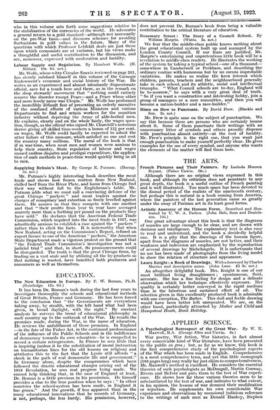Labour Supply and Regulation. By Humbert Wolfe. (H. Milford. 10s.
6d. net.)
Mr. Wolfe, whose witty Circular Saws is reviewed on page 261, has sternly subdued himself in this volume of the Carnegie Endowment's economic and social history of the War. He writes as an experienced and almost inhumanly dispassionate official, save for a touch here and there, as in the remark on the shop stewards' movement that "nothing could entirely remove the disorder except Peaceāand a Peace whose other and more lovely name was Utopia." Mr. Wolfe has performed the incredibly difficult feat of presenting an orderly narrative of the confused efforts of various Ministers and various Departments to find and retain workers for the munition industry without depriving the Army of able-bodied men. He explains, clearly and on the whole fairly, the wages ques- tion, though, as the official who signed Mr. Churchill's notorious decree giving all skilled time-workers a bonus of 121 per cent. on wages, Mr. Wolfe could hardly be expected to admit the utter failure of this measure, which satisfied no one and cost the country many millions. The moral of the book is that if in war-time, when most men and women were anxious to help their country, State regulation of labour and wages caused endless disputes and prodigal expenditure, the applica- tion of such methods in peace-time would quickly bring us all to ruin.


































 Previous page
Previous page